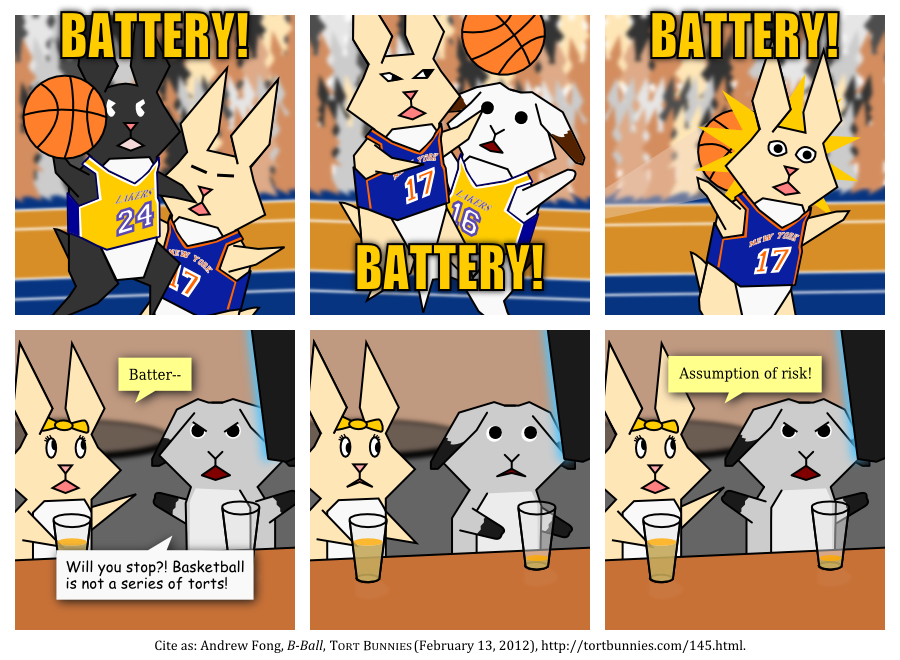As promised, we move on to the trickier issue of which websites should fall under Title III of the Americans with Disabilities Act. In my personal opinion, private websites, as a general rule, should not fall within the coverage of Title III. Making private individuals and entities legally liable for failure to make their websites accessible to the visually impaired is a problematic proposition, for the simple reason that a website is an amalgamation of many spaces. Andrew Fong, the creator of Tort Bunnies, points this out in his blog entry on the matter, and I quote:
First, Title III, or at least the part that would apply to websites, was designed to regulate "places." While we might consider websites to be places in cyberspace, there are important attributes of physical places that break down with virtual ones. For example, many websites include JavaScript/iFrame widgets that include code from other websites--e.g., a comment box from Disqus x x x, a Twitter badge, or a CAPTCHA to screen out spammers x x x. To the end-user, all of these widgets appear to be part of the page itself, but in reality, they're hosted and served from somewhere completely different. What appears to be one page is really an amalgamation of several pages, all operated and controlled by different actors. If one of these widgets in [sic] inaccessible, who's legally liable? The widget-maker or the page designer who decided to include the widget in the first place? What if all the widgets are independently accessible but when used in conjunction with each other become inaccessible? How about if at the time the page was first designed, the widgets were accessible, but a year later, the widget-maker pushed a change that made the widget inaccessible?
Indeed, since a website is an overlapping of many spaces, and since each of these spaces are controlled by different persons, natural or juridical, the question of liability becomes difficult to answer. Echoing Andrew, do we run after the owner of the website or that of the non-accessible webpage element, or are the both of them answerable: the former for using such an element in his website, and the latter for being the maker or owner of the same? This problem cuts across all types of private websites: from the amateur to the not-for-profit to the commercial.
In tandem with the argument above is the contention that to require blind-friendly websites from their owners is an unreasonable imposition, especially in the case of amateur website-builders (i.e., some kid learning code in his parents' garage). In my personal opinion, Title III extended to private websites, in general, is an unreasonable imposition. There is a gross disproportionality between the state interest to be promoted (protection of the rights of handicapped Americans) and the means employed to secure it. Websites are built on code, and code to make them accessible to the blind is neither easy to learn nor to implement. How is an amateur dabbler in website code who made a personal website and published it online supposed to know how to incorporate language in his/her code that will make his/her website accessible to the blind? Is it reasonable for the government to expect him/her to know how? How about the owner of a commercial website? Is it reasonable to require him/her to assume the costs of a more complicated website code to accommodate blind customers who may or may not exist? The only exception I can think of, where it would be reasonable to impose compliance to Title III, is in the case of websites owned by private-run entities that enjoy a franchise from the government, or those whose line of business is imbued with public interest.
Policy-wise, the extension remains a bad idea. Andrew argues, and I agree with him, that regulation of this sort will only operate to stifle creativity and innovation in the use of the web. He said: "If you make these people build for other people (and not pay them), a lot of that enthusiasm and innovation just goes out [of] the window. To put it another way, is a sighted programmer really the best advocate for the blind? You can force him/her to make his/her webpage accessible, but if you do, you'll probably just get a half-assed product."
So what now for the blind? My suggestion is for the government to invest money in technology that will make the issue of accessibility of individual websites moot, like a browser made specially for the visually challenged. This way, they end up with a quality product that fits their needs, instead of having to rely on sloppy code written and compiled by either an amateur or someone who could not care less about the blind.
On a far less serious note, enjoy Andrew's latest comic strip:
Note: The image above does not belong to me. No copyright infringement intended. All rights revert back to the owner.--Jan Nicklaus S. Bunag, Entry No. 9


No comments:
Post a Comment